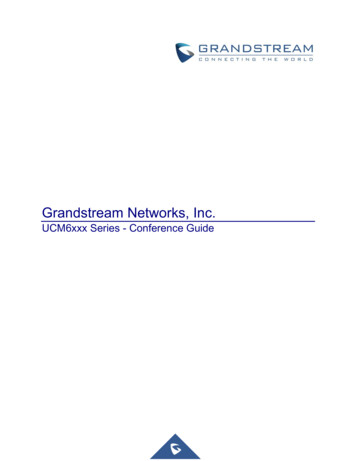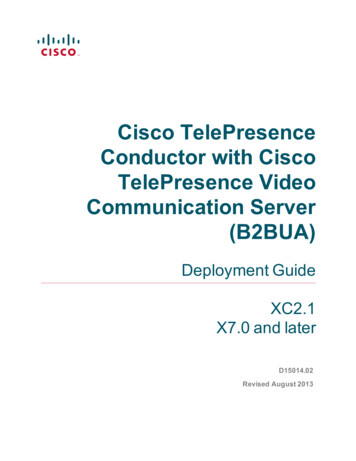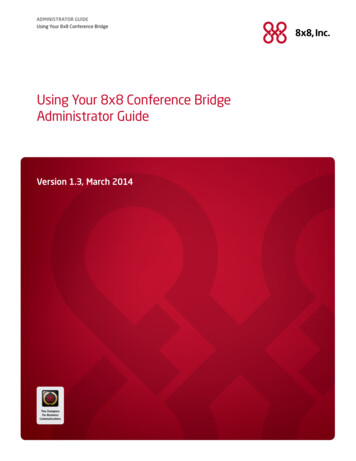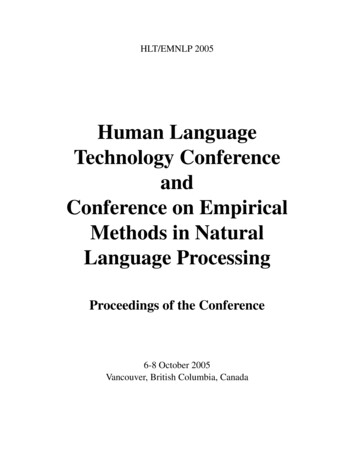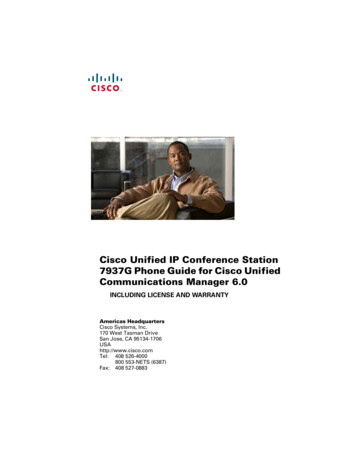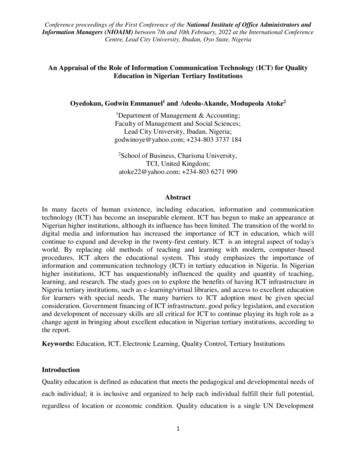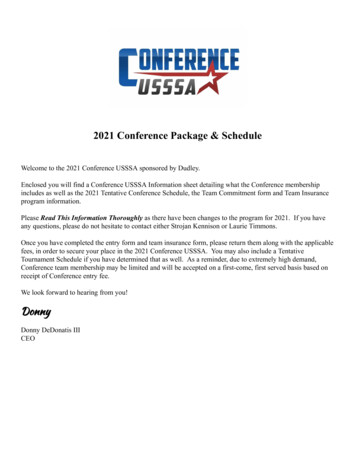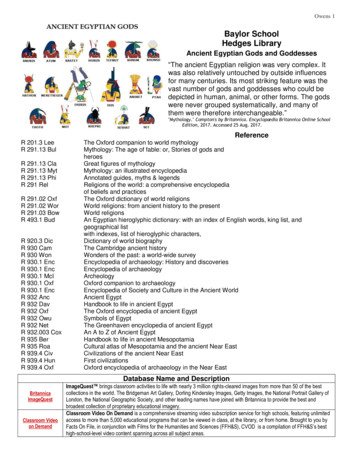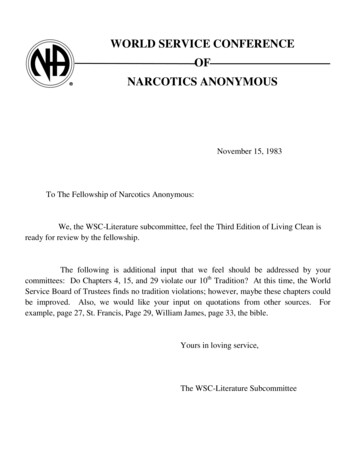
Transcription
WORLD SERVICE CONFERENCEOFNARCOTICS ANONYMOUSWORLFNovember 15, 1983To The Fellowship of Narcotics Anonymous:We, the WSC-Literature subcommittee, feel the Third Edition of Living Clean isready for review by the fellowship.The following is additional input that we feel should be addressed by yourcommittees: Do Chapters 4, 15, and 29 violate our 10th Tradition? At this time, the WorldService Board of Trustees finds no tradition violations; however, maybe these chapters couldbe improved. Also, we would like your input on quotations from other sources. Forexample, page 27, St. Francis, Page 29, William James, page 33, the bible.Yours in loving service,The WSC-Literature Subcommittee
Living CleanCopyright 1983
PRELIMINARY (THIRD) VERSIONLiving CleanThe New Member’s Guide to the Fellowshipof Narcotics Anonymous
duction: How to use this bookAre you an addict?What are your chances?Do I need a rehabilitation center?What is Narcotics Anonymous?MeetingsPeople, places and things: The GameGiving up roles: The toughest kid on the blockTaking care of yourselfOne day at a timeWhat to do about the cravingSponsorshipPrayer: It’s a spiritual programDoing everything overnightMethadone maintenanceBeing assertiveAlcohol vs. addictionI’ll never sleep againDrugs, doctors, and painTelephone therapyGetting activeLonelinessDry highs and using dreamsSex and relationshipsHOWAnger and resentmentsSelf-pityOther addictions: work, gambling, compulsive sexGetting into therapyDiet and exerciseChangesGetting into the 4566466697274767980
1.Introduction: How to use this bookThis book is intended primarily for the newcomer in the fellowship of NarcoticsAnonymous, although we hope that the information in it will be useful to all of ourmembers.Our drug using was the center of our lives. Around our drug use there developed asystem of attitudes, of a way of dealing or not dealing with our environment, that take usyears of staying clean to sort out. To recover, we had to change and to learn todifferentiate between recovery-oriented and drug-oriented behavior. We feel it isimpossible for newcomers to do this and to avoid the many pitfalls recovery holdswithout relying heavily on the experiences of those in the fellowship of NarcoticsAnonymous who have traveled the path before them. This book is a summary of ourexperiences, selected from our many collective years of recovery. For instance, should arecovering addict drink alcohol or take a medically prescribed narcotic? How can theaddict combat the craving for a drug? These are among the many topics discussed in thisbook.However, this book is not exhaustive. Nearly any member of Narcotics Anonymoushas additional good ideas. Nor is this book to be interpreted in any sense as the NarcoticsAnonymous program. That consists of the meetings, the fellowship, our literature, theTwelve Steps to recovery. Rather, this book should be considered a handbook ofpractical suggestions that can enable the newcomer to cope more effectively with a drugfree life on a day-to-day basis and to utilize better all aspects of recovery offered by theNarcotics Anonymous program.Narcotics Anonymous does not formally endorse all the opinions and suggestionsoffered in this book. However, any suggestions we make have in the past been useful tomany of our members, and we hope they will be useful to you.In consulting this book you should try to keep an open mind and to exercise yourown discrimination. Any principle, no matter how valid, can be perverted. For instance,one of the suggestions we give about combating the craving for a drug by eating anutritious snack can easily be rationalized into a scheme for compulsive eating. Andsometimes a chronically unemployed member justifies his situation by deferring to theslogan, Easy does it!Above all, try to be open minded about the spiritual matters discussed here.Although many of us entered the fellowship; violently opposed to ideas such as God andreligion, our collective experience has taught us that nothing will defeat us as surely asindifference to our spiritual growth. What exactly that expression means differs from oneperson to the next, but it usually has little to do with any of our preconceived ideas aboutGod or religion.2
One sometimes hears that the program is like a cafeteria. One takes the food onewants and leaves the rest behind, presumably to be taken by someone else or even thesame member later on in recovery. However, as no one can fare well on a diet consistingsolely of starches and desserts, so we need a balance of ideas in our lives. If you objectto or fail to understand something you read here, make a mental note to look at itsometime later in your recovery. You may find your appetite for it has changed.Our discussion of the Steps here is necessarily brief, and we can give no more thanan overview of how we apply these vitally important principles to our lives. Afterreading our discussion you will undoubtedly seek a more in-depth knowledge of theSteps. To acquire this, you should make Step meetings a regular part of your meetingschedule.For us, recovery starts by quitting the use of mood-changing chemicals. But that isonly the start. Stopping is easy. Staying stopped is hard. It requires that we be preparedto change our habits, attitudes, actions, and personalities. We discover we can no longeract or think the way we used to and expect to stay clean. We hope this booklet will helpyou to make the necessary changes, and we hope it will convince you that there are otherswho were once in your situation who have, through the program of NarcoticsAnonymous, discovered fullness of life.2. Are you an addict?So you’re new in Narcotics Anonymous? We’re glad to have you here. We thinkyou’ll meet a lot of people whose experiences you’ll identify with, people you’ll like. Inappearance our members don’t differ much from people you might see on an averagestreet in an average city. Maybe they’re a little younger, but that’s because the problemswe have in common tend to come up; early in life. Still, you’ll find the middle-aged andolder citizens are among us. And we have cooks, housewives, salesmen, mechanics,secretaries, doctors, pharmacists, teachers, the unemployed. Everyone you can imagine.The whole spectrum of humanity is represented.However, we do have things in common. At one time our lives seemed to haveground to a halt and no matter what we did nothing good seemed to happen to us. Wesuspected--but were not always entirely certain--that drugs and/or alcohol had somethingto do with it. Were drugs the cause of our problems or the result of them? We askedourselves. Our opinions on this seemed to change, as yours undoubtedly have, from onemoment to the next. When we began to attend meetings of Narcotics Anonymous wediscovered the truth. You will, too.Who comes into Narcotics Anonymous? What are our histories? Many and varied.There is the housewife recovering from a suicide attempt--not convinced the pills caused3
her to try to kill herself. They were just the method she used. And professional men,doctors and pharmacists in particular, who needed an amphetamine to get started in themorning and a sleeping pill to get to bed at night and watched in horror as the habitslowly escalated. Soon they were taking an endless string of medications, each tocounteract the side effects of the previous medication. We have students whose collegecareers are in a shambles because they’ve become paranoid and lost their motivation. “Apot addict? How could I be? Everyone smokes pot!” Then there are the very young--thehuffers and street drug users who could never even make the pretense of getting theirlives off the ground--they were high almost from the cradle. Then there are the admittedjunkies, sometimes defiant, just out of a drug rehabilitation center to which a court hadstipulated them, contemptuous of lowly pill users or those who drank alcohol. “Hell yes,I’m a junkie.” (We’ve all played that game in one form or another. We call it “high butproud.”)But despite the differences in our backgrounds, we all stayed around. NarcoticsAnonymous brought drastic changes in all our attitudes--toward ourselves, toward others,and above all, toward drugs. Glue. Pot. Quaaludes. Valium. Heroin. Alcohol. Speed.Cocaine. LSD. Percodan. What do they all have in common? What they have incommon is us. We’re drug addicts.Drug addicts? Isn’t that an awfully strong phrase? For the housewife or studentwho never gets closer to a needle than a stereo player it conjures up a bizarre image,maybe a dormitory with pale bodies laying around on mattresses, spikes sticking out ofarms and pools of blood congealing on the floor. But that, obviously, isn’t what youfound when you came here. The people seem well-groomed, and are apparently happy.They’re full of energy, enthusiastic about sharing their feelings and hopes, their victoriesand defeats with others. The fact is, when we’re clean no one can tell us from theaverage person on the street.What is a drug addict then? There are several good definitions, but one of ourfavorites is the following: Drug addicts are people who have lost the ability to controltheir lives because of the use of drugs.We each have a favorite drug or drugs, our “drug of choice”; one sometimes hears itcalled at meetings. But we can switch addictions very easily. If one drug isn’t available,we will make do with another. Many are the addict who has tried to control an addictionby switching drugs. The result is always predictable. Sometimes we switch to alcohol,feeling that, because it’s a socially approved drug, it must certainly be preferable toheroin or Quaaludes. A disaster always follows (See the section, “Alcohol vs.addiction”). We have seen heroin addicts die from drinking alcohol. And taking a newdrug will lead to using our drug of choice.4
Like any other disorder, drug addiction has certain symptoms associated with it.These symptoms are remarkably predictable, despite the great variety of substancesinvolved.For instance, drug addiction is progressive. Look at the way you were last using.Compare it with the way you were using two years ago. With the way you were usingwhen you began. Do you notice a progression? Undoubtedly. It’s downhill. Drugs arecausing you more pain now than they used to. True, there were periods in our usingduring which we used drugs very little or not at all. But we always found the periods--wecall them “plateaus”--brief and our freedom from drugs only temporary.Of course, there are other symptoms. We have found it effective to present some ofthe symptoms of drug addiction as a series of questions.Perhaps you admit you have a problem with drugs, but seriously doubt you are anaddict, or at least an addict in the same sense that we apply that word to ourselves. If youhave such reservations, read the questions below and answer them carefully.1) Is drug using making your life at home unhappy?2) Have you ever switched from one drug to another or to multiple drugs, trying tofind the perfect high?3) Has your ambition decreased since using drugs?4) Have you ever taken more than the prescribed dosage of a prescription drug, orresorted to lying to obtain it?5) Have you ever stolen drugs or alcohol?6) Have you gotten into financial difficulties as a result of using drugs?7) Do you use to feel less shy or to feel you belong?8) Do you feel guilty about using?9) Have you ever been in a hospital, jail, or drug rehabilitation center because ofyour using?10) Does using interfere with your sleeping or eating?11) Do you become defensive when people mention your drug using to you?12) Does just having drugs in your possession give you a thrill?13) Have you ever tried to stop using drugs?14) Do you think a lot about using drugs?15) Have you noticed your pattern of drug use changing recently?16) Do you jealously guard your stash of drugs?17) Are you plagued with indefinable fears?18) Do you sometimes think you could get your life straightened out if you movedsomewhere else?5
19) Do you find yourself jealous, aggressive, angry, or resentful in situations thatwouldn’t have caused you to be some time ago?20) Have you even gotten high when you were alone?21) Do you regularly have to have a drug before going to bed, or on arising?22) Has your using affected your sexual desire or performance?23) Do you ever take one drug to overcome the bad effects of another?24) Do you have fewer friends now than two or three years ago?25) Do you ever go on prolonged binges of drug usage?26) Do you find yourself using drugs around people you think are inferior to you?27) Have you ever used street chemicals of unknown composition?28) Does the idea of a life without drugs terrify you?29) Have you ever had the shakes?30) Do you use drugs or drink to control your feelings?31) Have you ever searched for a spiritual answer for your life, but couldn’t seem tofind it?32) Do you enjoy getting high less than you used to?33) Do you avoid your family when using?34) Has your job performance ever suffered as a result of using drugs?35) Do you ever feel you could do more with your life if you didn’t use drugs?Quite a list, isn’t it? Note that some of the questions, numbers 19 and 31, forinstance, don’t even mention drugs. This is because addiction is an insidious problemthat affects all areas of our lives--even those areas which seem at first glance to have littleto do with drugs. Further, no specific drug is mentioned. Though there are lots ofdifferent drugs, they all spell one disease for us.Well, how did you do? As a rule of thumb, we might say if you answered five ormore of the above questions “yes”, you definitely have a drug problem. And the morequestions you answered “yes”, the further along the road of addiction you are. We wouldprobably say that those who answer under ten of the questions yes are still in the earlystages of drug addiction, over ten in the middle or later stages of addiction. However,once we begin to develop symptoms of drug addiction, the disease will invariably run itscourse, unless we arrest it by halting our drug use. One often hears it said that being alittle bit of a drug addict is like being a little bit pregnant. And it’s true.Some of us at first dismissed such tests with words like “Oh, that test’s screwed up,”or “I’m special.” “I know I take drugs, but not because I’m an addict.” “I have real(emotional, family, job) problems.” Or “I’m just having a tough time getting it togetherright now.” Or “I’ll be able to stop when (I find the right person, get the right job, etc.).”6
Suppose you come down with severe abdominal pains and a high fever. The doctordiagnoses acute appendicitis and schedules you for immediate surgery. Do you have itdone? Of course. You’d be a fool not to. In other words, you have faith in his expertiseand experience. Yet, you’ve probably never seen his medical diploma, or asked himwhat his standing was in his graduating class.We in Narcotics Anonymous have expertise and experience, too: a direct, firsthandknowledge of drugs that’s rivaled by no other group of people on the face of the earth.Furthermore, we know what to do about a drug problem. The people sitting around youat a Narcotics Anonymous meeting are clean, some for many years. The abovequestionnaire reflects our expertise with drugs. Why should you doubt us and not thedoctor? We’ll tell you why. Drug addiction is a peculiar disease. It’s the only diseasethat tells you; you don’t have it. And it’s fatal, too, usually more unpleasantly so thanappendicitis. Like appendicitis, though, there is a remedy--it’s called recovery, or gettingclean or staying straight, we use all these phrases interchangeably. It involves gettingactive in a program, the program of Narcotics Anonymous that will keep you free ofdrugs one day at a time and, furthermore, give you the new life you’ve been looking for.Do you want to go for it? We hope so.3. What are your chances?We in Narcotics Anonymous believe that drug addiction is a progressive diseasewhich, unless arrested, will invariably lead to jails, institutions or death. We believe thatit cannot be cured, in the sense that the addict can never return to some kind ofnondestructive drug use--but can only be arrested. The Narcotics Anonymous programacts to arrest our addiction by helping us to abstain from drugs, that is, from anysubstance that causes us to get high or that is either mind changing or mood changing.For the person who has not yet faced his or her addiction squarely, the first sentenceabove is a very frightening one. It was for all of us. Even more frightening was thethought of having to endure a lifetime without drugs-deprived of any means of quietingour fears or forgetting our troubles or lifting our spirits. It seemed like the cruelestpossible fate. One newcomer said it sounded like being buried alive.But this is the choice you must make. You are now standing at the great turningpoint in your life. You will choose to either travel the way we have traveled, or to returnto the life you have come from. The decision--we call it the First Step--has to be yours.We cannot make it for you; although once you make it we can help you in your life ofrecovery by sharing with you our experiences. The life of using is full of fear and7
loneliness. There is fear in being clean, too, but you can share that fear with others whocare for you and thereby lessen it. Moreover, in recovery you will find joy and love. Forthe first time in your life, perhaps, you will feel you belong. You will find you canfinally quit running. You will find a home.We have said that drug addiction is incurable. How do we know? By ourexperience. We have not yet seen an addict who can return to non-addictive drug use.We have seen many try, and many die trying. Some are lucky. They are able to make itback to the program; but on returning, they are always worse off than before. More thanlikely, some of the painful using experiences they had heard other addicts speak of atmeetings and which had not yet happened to them did, in fact, happen when theyresumed using drugs. Certain drugs they told themselves they would never use theyended up using, or an action--a lie, a theft, a deliberate cruelty--they had consideredthemselves incapable of they found themselves committing. Sometimes, more tragically,an accident or a fire or an overdose had left them permanently afflicted. We know ofaddicts now blind who once could see, terribly scarred who once were unmarked,crippled who once could walk. Drug addiction is serious business.In the program you may occasionally hear the words “relapse” or “slip” used. Theseterms refer to the actions of a member who resumes using drugs. Many of our membershave never experienced a slip. However, we all have our own timetable for recovery.Some of us are not really ready when we reach Narcotics Anonymous, and we may findourselves using again even after a prolonged period of staying clean. Those of us whohave resumed drug use and have been fortunate enough to make it back to the programalways bear eloquent witness to the fact that our addiction is progressive. Even if you donot find continuous abstinence immediately, it is important that you attend meetings.None of our members will condemn or judge you. There is a saying that we are allslippers, but some of us had all our slips before we found the program. Althoughcomplete and continuous abstinence always furnishes the best ground for personalgrowth, it is possible for you to learn by attending meetings even though you cannotaccumulate any length of clean time. The experience of being around people who areclean and getting better may, one day, give you the strength and courage to close the dooron drugs.At the very least, returning to using confronts us with new dimensions of despairand hopelessness. One addict who had tried it said he was genuinely surprised at theviolence of it. And, it comes as a shock to us that we just cannot seem to get very highanymore. Nothing--no new or imaginative combination of chemicals--works to get usvery high. We go from being free of drugs to being helpless with almost no intervening8
period of elation. Drugs, our closest, most faithful and dependable friends, have finallybetrayed us. There is no way we can use and enjoy drugs the way we once did.Whether we know it or not, the party is over. If we can accept this fact, it will help usturn our backs on drugs and to move toward recovery. If we do not accept it, eventhough we stay clean, we will be stuck in a fantasyland, craving and obsessing about thechemicals that, in fact, can no longer give us much pleasure.We believe there is a strong physical component in addiction, and that theprogression of the disease reflects some as yet undiscovered change in our bodychemistry. There is no way we can change our body chemistry, change it back towhat it once was.What are your chances? Without a program, very poor. Although we in NarcoticsAnonymous don’t keep statistics, it has been estimated that 97 percent of drug addictsnever recover. However, statistics are misleading--they are applicable only to largesamples. They cannot describe individual cases. We in Narcotics Anonymous firmlybelieve that no one is any stronger or any weaker than anyone else. If you sincerelywant what we have and are willing to go to any lengths to get it, your chances of gettingclean are 100 percent. In fact, we will make you a specific guarantee that, if you takecertain suggested steps, you will not use. The steps you must take, and which aredescribed in the rest of this book, are very simple. They are simple and practical. We arepractical people. Coming to terms with the fatal nature of our addiction made us thatway.4.Do I need a rehabilitation center?Occasionally the newcomer must make the decision to go into a rehabilitation center(rehab)--or-a detoxification unit. Those with a history of the abuse of downers are themore likely candidates for this kind of special treatment. Convulsions followingwithdrawal from sedatives are a medical crisis, and if you have a history of sedativedependency, you should talk to someone in the program about it. We are generally verywilling to help you find a facility for detoxification.There are several good reasons for going to a rehab other than to weather out theeffects of drug withdrawal. It may provide the newcomer with the opportunity to escapean intolerable living or working environment, for instance, the addicted pharmacist ordoctor, or a person who is living with his parents but exists in a total temperamentaldeadlock with them. When family gatherings are a nightmare of screaming andrecriminations and yet some degree of financial dependence on the family is, for themoment, necessary, the newcomer should consider the possibility of going into a rehab.9
There are a number of rehabs which are strongly program oriented, and their successrate is high. We tend to recommend these over rehabs whose orientation is moreanalytical, and in which the client is exposed to attack therapy or endless probing for“causes” of using. We addicts, being cunning and very perceptive about the expectationsothers have of us, fit into such an analytical environment beautifully. We canmanufacture more crises, insights and breakthroughs in a week than ten ordinary people.But deep down we don’t really believe a word of it, and it generally only delays ourconfronting the true issue: our addiction.If you are confused and don’t know whether you need a rehab or not, discuss it withprogram people. A good rule of thumb is: If people tell you that you need a rehab, youprobably do.5.What is Narcotics AnonymousNarcotics Anonymous is a fellowship of men and women who are drug addicts butwho no longer use. We are not composed of professional, social, health, or governmentworkers except as such people may themselves be addicts. The only requirement formembership in Narcotics Anonymous is the desire to quit using drugs. We do not carewhat drugs you used or what your past activities were. Our only concern is whether ornot you wish to get clean.Narcotics Anonymous is not associated with any religious sect or governmentalorganization and does not oppose nor endorse any special causes. We exist solely to stayclean ourselves and help other addicts to get clean. Your will be charged nothing formembership in Narcotics Anonymous; we support ourselves through our owncontributions.We believe that drug addiction is not a single disorder but rather a three-fold illness:part physical, part mental, part spiritual. The way that our addiction affects each of theseaspects of our being and the way the program works to relieve our addiction--to healthese three parts of us--are the subject of this book.Quite briefly, the healing we receive through Narcotics Anonymous comes throughmeetings, through the strength and support offered by the fellowship, and through theapplication of certain principles to our lives.It is our firm belief, one based on an enormous amount of observation and firsthandexperience, that no one, once an addict, can return to the informal use of drugs. It is forthis reason that Narcotics Anonymous is a program whose immediate goal iscomplete abstinence from all drugs. We stop using, period. The program gives us thestrength, one day at a time, not to pick up the first drug.10
Narcotics Anonymous does not make a decision as to whether you or any otherperson is a drug addict. We can tell you what certain symptoms of drug addiction are andshare some of our experiences with you. The diagnosis of your own condition you alonecan make.Narcotics Anonymous has no official opinion on outside issues. We do not, forinstance, get involved with efforts to legalize or penalize the use of any drug. To do sowould detract us from our primary purpose: to get and stay clean.Narcotics Anonymous has worked for us. Our combined membership hasaccumulated many, many centuries of continuous clean time. Most of us had tried otherways to rid ourselves of the problems caused by drugs. These methods usually consistedof redefining our addiction in purely medical or psychological terms. While, as anorganization, we have no direct quarrel with such therapies, for us they did not work.They held out to us hope, but the hope was soon betrayed. Perhaps we even thought wehad finally found the causes for our use of drugs; nevertheless, we still used. Among uswe could write a guide book to therapies. It was as a last resort many of us came intoNarcotics Anonymous: bitter, cynical, without hope. And it was there that we weregiven new lives.A new life can be yours for the asking, too. There is no problem that you canconceivably have that other Narcotics Anonymous members have not had. The NarcoticsAnonymous program can help us to overcome or live with any problem. We all thoughtwe were somehow special or unusual. It was one mechanism we used for keepingourselves isolated and addicted. We were college graduates or we never finished highschool or we were gay or of the wrong social class or had extraordinary physical oremotional problems. We came to see all of these as cop-outs. You will find as we didthat recovering drug addicts are all alike in the only way that matters. When youcome into Narcotics Anonymous you are no longer alone.Narcotics Anonymous has meetings in the major American cities and abroad. If youtravel, you will find you are part of a great and growing fellowship. The help iseverywhere and is yours only for the asking.6.Meetings“Go to meetings, meetings and more meetings,” is the advice we get as newcomers,“and when you’re sick and tired of meetings go to still more meetings.” One newcomerwas astonished to hear his sponsor tell him that he was so sick he needed meetings ninedays a week. In fact, the most frequent advice to newcomers is, “Go to ninety meetingsin ninety days.”11
The fact is, meetings form the basis of Narcotics Anonymous. Without meetings,we would fail to function as an organization doing what we exist to do. For members ofNarcotics Anonymous, meetings are the single most important means of getting andstaying clean. Those of us who relapse into drug use have usually slowed down orstopped our meeting attendance, and it seems those of us who attend the most meetingshave the most well-balanced and gratifying recovery.Meetings are to us what tools and materials are to a carpenter. They are thematerials with which we build a new life.It is important for us to remember that the game of using occupied all our time. (Seethe section, “People, places and things: the Game.”) Even when we weren’t using drugswe were thinking about using drugs. When drugs and the Game of getting them are takenfrom our lives an enormous gulf opens within us. “What am I going to do with mytime?” we wonder. And the question is asked more in panic than in curiosity. It seems asthough the center has been yanked from our lives. We suddenly discover we don’t knowhow to behave with others, how to carry on a casual conversation or even where to putour hands-without the reassuring roles using provided us.It is meetings that fill up the gulf and work to change us. The effect they have onour attitudes is unimaginable to one who has not experienced them. A member, nowclean many years, recalls his first year in the program. “Every day I felt suicidal. Iwould say to myself, ‘Well, I promised them I would do ninety meetings in ninety days.I’ll go to a meeting tonight and then I’ll kill myself.’ After I left the meeting I wouldwonder why I had been so upset.”In meetings our fear is replaced with faith, self-pity with concern for others, despairwith hope, resentment with understanding, self-loathing with self-acceptance. We aren’talone anymore; we are loved and valued and accepted for what w
book. However, this book is not exhaustive. Nearly any member of Narcotics Anonymous has additional good ideas. Nor is this book to be interpreted in any sense as the Narcotics Anonymous program. That consists of the meetings, the fellowship, our literature, the Twelve Steps to recovery. Rather, this book should be considered a handbook of
